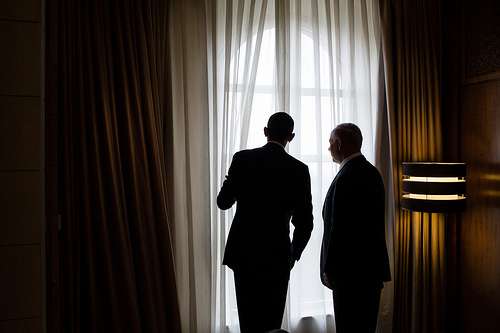Why All of Us Should Mistrust the Government
It should come as no surprise that President Obama told Ohio State students at graduation ceremonies last week that they should not question authority and they should reject the calls of those who do. He argued that "our brave, creative, unique experiment in self-rule" has been so successful that trusting the government is the same as trusting ourselves; hence, challenging the government is the same as challenging ourselves. And he blasted those who incessantly warn of government tyranny.

Yet, mistrust of government is as old as America itself. America was born out of mistrust of government. The revolution that was fought in the 1770s and 1780s was actually won in the minds of colonists in the mid-1760s when the British imposed the Stamp Act and used writs of assistance to enforce it. The Stamp Act required all persons in the colonies to have government-sold stamps on all documents in their possession, and writs of assistance permitted search warrants written by British troops in which they authorized themselves to enter private homes ostensibly to look for the stamps.
These two pieces of legislation were so unpopular here that Parliament actually rescinded the Stamp Act, and the king's ministers reduced the use of soldier-written search warrants. But the searches for the stamps turned the tide of colonial opinion irreversibly against the king.
The same king also prosecuted his political adversaries in Great Britain and here for what he called "seditious libel" -- basically, criticizing the government. Often that criticism spread and led to civil disobedience, so the British sought to punish it at its source. The prosecutions were so unpopular here, and so contrary to the spirit of what would become the Declaration of Independence, that when the British went home and the Framers wrote the Constitution and the Bill of Rights was added, the First Amendment assured that the new government could not punish speech.
Yet barely 10 years into "our brave, creative, unique experiment in self-rule," in the infamous Alien and Sedition Acts, Congress at the instigation of President John Adams criminalized free speech that was critical of the new government.
How did it come about that members of the same generation -- in some cases the very same human beings -- that declared in the First Amendment that "Congress shall make no law … abridging the freedom of speech" in fact enacted laws that did just that?
As morally wrong, as violative of the natural law, as unconstitutional as these laws were, they were not historical incongruities. Thomas Jefferson -- who opposed and condemned the acts (he was Adams' vice president at the time) -- warned that it is the nature of government over time to increase and of liberty to decrease. And that's why we should not trust government. In the same era, James Madison himself agreed when he wrote, "All men having power should be distrusted to a certain degree."
The Alien and Sedition Acts were but the beginning of a long train of government abuses visited upon people in America as a consequence of the "experiment in self-rule." I am not quoting Obama's Ohio State speech to nitpick, but rather to establish a base line for my argument that he rejects core principles and historical lessons and, most troubling, the natural law itself when he opines that government should be trusted because it has gained power via self-rule.
Self-rule alone is hardly a basis for governmental legitimacy, unless it is accompanied by fidelity to the natural law and to the rule of law. The rule of law here means fidelity to the Constitution, that all laws are just and apply to everyone, so no one is excused from obeying the laws and no one is excluded from their protections. Yet, self-rule here has been unjust and has brought us the tyranny of the majority. And that tyranny has brought us slavery, unjust wars, Jim Crow laws, domestic concentration camps in wartime, slaughter of babies in the womb, domestic spying without search warrants, torture and death by drones -- just to name a few.
The reason Obama likes government and the reason it is "a dangerous fire," as George Washington warned, and the reason I have been warning against government tyranny in my public work is all the same: The government rejects the natural law because it is an obstacle to its control over us. The natural law is divinely embedded in our souls. It is manifested by the universal yearning for freedom and justice. It consists of areas of human behavior -- thought, expression, religion, self-defense, travel, acquisition and use of property, privacy, for example -- in which our behavior is subject only to the exercise of our free will and not the permission of our neighbors or regulation by the government. The natural law, properly understood, is a restraint on the government.
Yet, government in America -- whether it consists of Congress protecting the slave trade, or John Adams or Abraham Lincoln or Woodrow Wilson prosecuting political speech, or FDR incarcerating Japanese-Americans, or George W. Bush promising immunity for torturers and domestic warrantless spies, or Obama killing whomever he chooses with drones -- has never hesitated to reject the natural law. All of these violations of the natural law were approved by the majority when undertaken. The government's persistent and systematic rejection of the natural law is alone sufficient to mistrust government and reject Obama's Ohio State advice.
The government that has come about by self-rule derives its powers from the consent of the governed. Because the tyranny of the majority can be as dangerous to freedom as the tyranny of a madman, all use of governmental power should be challenged and questioned. Government is essentially the negation of liberty. If we fail to challenge government at every turn, there will be no liberty remaining for us to defend when the government tries to negate it.


Show Comments (122)